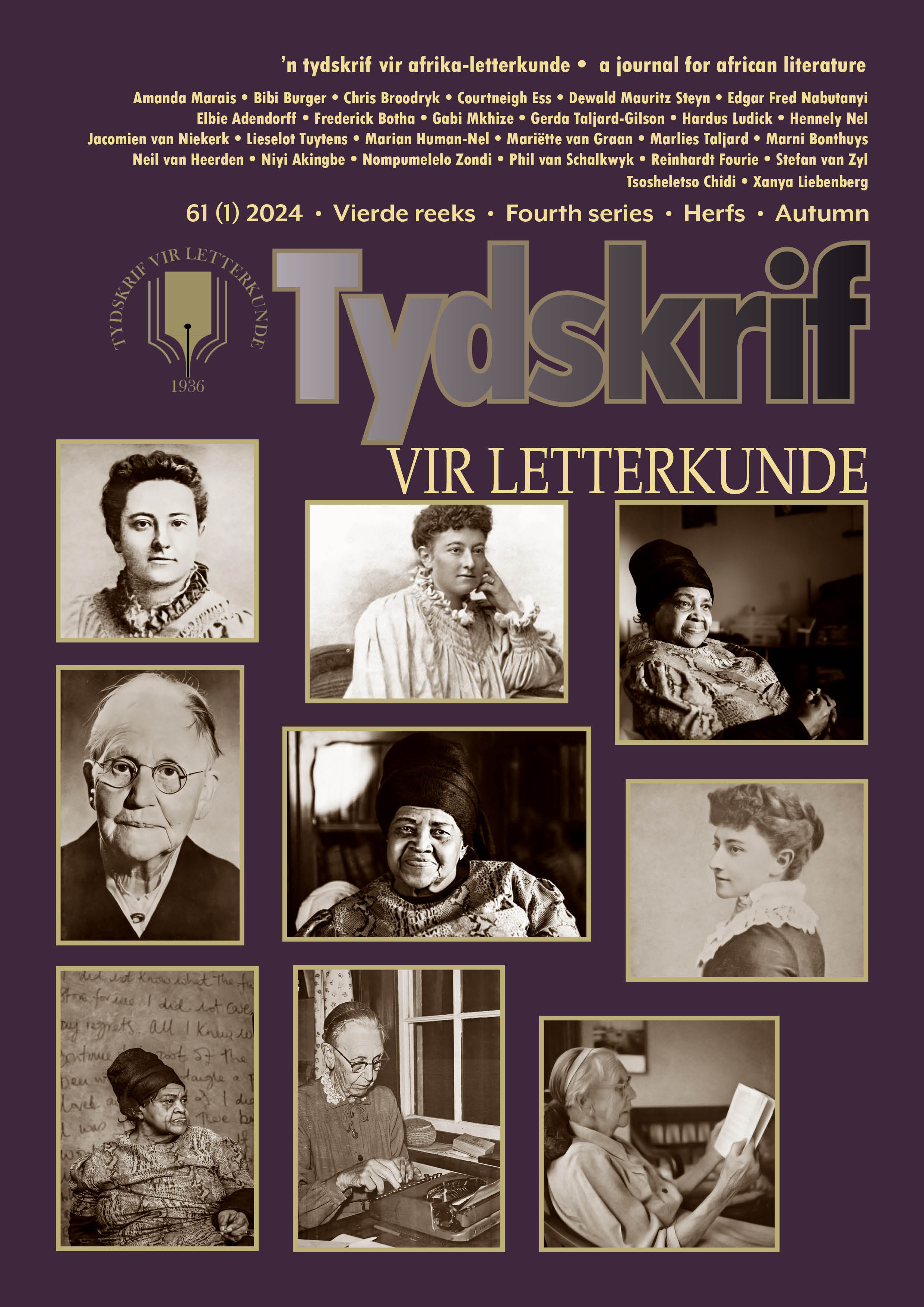Citizenship and social status in Miriam Tlali’s Muriel at Metropolitan
DOI:
https://doi.org/10.17159/tl.v61i1.16064Keywords:
intersectionality, citizenship, social status, apartheid, African Customary Law, Miriam TlaliAbstract
An intersectional feminist stance was reflected in South African literary texts as early as the 1970s. Miriam Tlali’s pioneering work Muriel at Metropolitan (1975), for example, explores how black women are most palpably confronted with intersecting oppressions and inequalities because of mutually reinforcing axes of race, ethnicity, gender, and class. These social categories provided the basis to differentiate groups from each other and were utilised to produce unequal power relations. Such inequalities were not only created by the apartheid regime, but also by African Customary Law, although the latter was subject to the twin influences of colonialism and apartheid. In this article I analyse five key passages of the novel through an intersectional lens by looking into the correlation between these systems, intersectional axes, citizenship, and social status. The close reading of the extracts shows that the characters’ civil rights are curtailed, and their social status reduced through inter alia dehumanising stereotypes, racial and gendered naming strategies, and polarising pronouns. Furthermore, the discursive counterreactions of the black female protagonist Muriel are charted. These consist of rational argumentation, norm-breaking, objectification, and distancing techniques. Her retorts represent her resistance against multiple subjugations and take the shape of what is now called intersectional feminism(s).
Downloads
References
Allott, Antony. New Essays in African Law. Butterworth, 1970.
Arndt, Susan. “Perspectives on African Feminism: Defining and Classifying African-Feminist Literatures.” Agenda vol. 17, no. 54, 2002, pp. 31–44.
Bennett, Thomas W. A Sourcebook of African Customary Law for Southern Africa. Juta, 1991.
Bennett, Thomas W. The Application of Customary Law in Southern Africa: The Conflict of Personal Laws. Juta, 1985.
Boswell, Barbara. And Wrote My Story Anyway: Black South African Women’s Novels as Feminism. Wits U P, 2020. DOI: https://doi.org/10.18772/12020096185
Boswell, Barbara. “Echoes of Miriam Tlali.” Surfacing: On Being Black and Feminist in South Africa, edited by Desiree Lewis & Gabeba Baderoon. Wits U P, 2021, pp. 198–214. DOI: https://doi.org/10.18772/22021046093.18
Boswell, Barbara. “Overcoming the ‘Daily Bludgeoning by Apartheid’: Black South African Women Writers, Agency, and Space.” African Identities vol. 15, no. 4, 2017, pp. 414–27. DOI: https://doi.org/10.1080/14725843.2017.1319754. DOI: https://doi.org/10.1080/14725843.2017.1319754
Boswell, Barbara. “Rewriting Apartheid South Africa: Race and Space in Miriam Tlali and Lauretta Ngcobo’s Novels.” Gender, Place & Culture vol. 23, no. 9, 2016, pp. 1329–42. DOI: https://doi.org/10.1080/0966369X.2016.1160035. DOI: https://doi.org/10.1080/0966369X.2016.1160035
Carastathis, Anna. Intersectionality: Origins, Contestations, Horizons. U of Nebraska P, 2016. DOI: https://doi.org/10.2307/j.ctt1fzhfz8
Collins, Patricia Hill et al. “Intersectionality as a Critical Social Theory.” Contemporary Political Theory vol. 20, no. 3, 2021, pp. 690–725. DOI: https://doi.org/10.1057/s41296-021-00490-0. DOI: https://doi.org/10.1057/s41296-021-00490-0
Cullhed, Christina. Grappling with Patriarchies: Narrative Strategies of Resistance in Miriam Tlali’s Writings. Uppsala, 2006.
Elias, Taslim Olawale. The Nature of African Customary Law. Manchester U P, 1956.
Ettin, Andrew Vogel. Betrayals of the Body Politic: The Literary Commitments of Nadine Gordimer. U of Virginia P, 1993.
Gouws, Amanda. “Feminist Intersectionality and the Matrix of Domination in South Africa.” Agenda vol. 31, no. 1, 2017, pp. 19–27. DOI: https://doi.org/10.1080/10130950.2017.1338871. DOI: https://doi.org/10.1080/10130950.2017.1338871
Gqola, Pumla Dineo. Miriam Tlali: Writing Freedom. HRSC, 2021.
Hames, Mary. “Teaching Black, Teaching Gender, Teaching Feminism.” Surfacing: On Being Black and Feminist in South Africa, edited by Desiree Lewis & Gabeba Baderoon. Wits U P, 2021, pp. 56–72. DOI: https://doi.org/10.18772/22021046093.8
Himonga, Chuma & Thandabantu Nhlapo. African Customary Law in South Africa: Post- Apartheid and Living Law Perspectives. Oxford U P Southern Africa, 2014.
Lewis, Desiree & Gabeba Baderoon. Introduction. Surfacing: On Being Black and Feminist in South Africa. Wits U P, 2021, pp. 1–14. DOI: https://doi.org/10.18772/22021046093.4
Meer, Shamim. “Freedom for Women: Mainstreaming Gender in the South African Liberation Struggle and Beyond.” Gender and Development vol. 13, no. 2, 2005, pp. 36–45. DOI: https://doi.org/10.1080/13552070512331332285
Moolman, Benita. “Rethinking ‘Masculinities in Transition’ in South Africa Considering the ‘Intersectionality’ of Race, Class, and Sexuality with Gender.” African Identities vol. 11, no. 1, 2013, pp. 93–105. DOI: https://doi.org/10.1080/14725843.2013.775843. DOI: https://doi.org/10.1080/14725843.2013.775843
Muhlebach, Andrea. “Between the Fires: Gender and Post-Apartheid Reasoning in Two South African Novels: Nadine Gordimer’s Burger’s Daughter, and Miriam Tlali’s Muriel at Metropolitan.” Journal of Postcolonial Writing vol. 36, no. 1, 1997, pp. 65–85. DOI: https://doi.org/10.1080/17449859708589263. DOI: https://doi.org/10.1080/17449859708589263
Nash, Jennifer C. “Feminist Originalism: Intersectionality and the Politics of Reading.” Feminist Theory vol. 17, no. 1, 2016, pp. 3–20. DOI: https://doi.org/10.1177/1464700115620864. DOI: https://doi.org/10.1177/1464700115620864
Ndulo, Muna. “African Customary Law, Customs, and Women’s Rights.” Indiana Journal of Global Legal Studies vol. 18, no. 1, 2011, pp. 87–120. DOI: https://doi.org/10.2979/indjglolegstu.18.1.87. DOI: https://doi.org/10.2979/indjglolegstu.18.1.87
Obiora, Leslye Amade. “Reconsidering African Customary Law.” Legal Studies Forum vol. 17, no. 3, 1993, pp. 217–52.
Samuelson, Meg. “Writing Women.” The Cambridge History of South African Literature, edited by David Atwell & Derek Attridge. Cambridge U P, 2012, pp. 757–78. DOI: https://doi.org/10.1017/CHOL9780521199285.038
Tamale, Sylvia. Decolonization and Afro-Feminism. Daraja, 2020.
Tlali, Miriam. Muriel at Metropolitan. Ravan, 1975.
Wing, Adrien Katherine & Eunice P. de Carvalho. “Black South African Women: Toward Equal Rights.” Harvard Human Rights Journal vol. 8, 1995, pp. 57–100.
Winker, Gabriele & Nina Degele. “Intersectionality as Multi-Level Analysis: Dealing with Social Inequality.” European Journal of Women’s Studies vol. 18, no. 1, 2011, pp. 51–66. DOI: https://doi.org/10.1177/1350506810386084. DOI: https://doi.org/10.1177/1350506810386084
Yuval-Davis, Nira. “Intersectionality and Feminist Politics.” European Journal of Women’s Studies vol. 13, no. 3, 2006, pp. 193–209. DOI: https://doi.org/10.1177/1350506806065752. DOI: https://doi.org/10.1177/1350506806065752
Downloads
Published
Issue
Section
License
Copyright (c) 2024 Tydskrif vir Letterkunde

This work is licensed under a Creative Commons Attribution-ShareAlike 4.0 International License.


 https://orcid.org/0000-0001-6465-6584
https://orcid.org/0000-0001-6465-6584


.png)